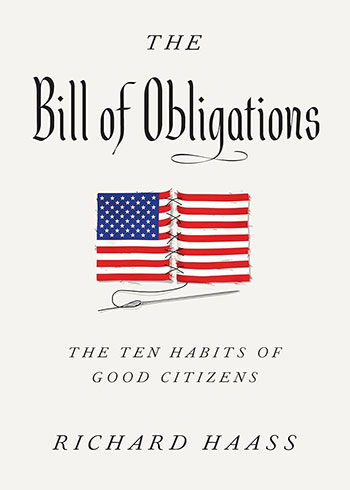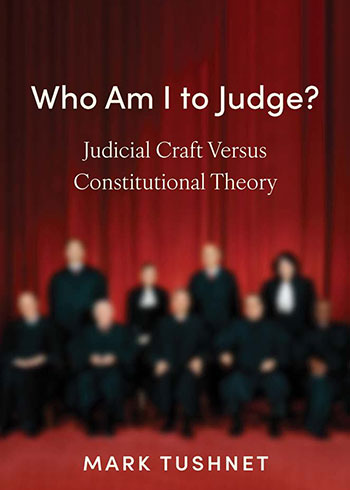VERDICT: Touchdown!
The Bill of Obligations: The Ten Habits of Good Citizens

By Dr. Richard Haass (Penguin Press: New York, 2023). 240 pgs. $9.99. Order, www.amazon.com.
Reviewed by James Casey
In these consequential times, it is important to think about and discuss what it means to be a United States citizen (in this book, the word “citizen” is used in a general sense and not in a specific immigration law sense). This examination is what Dr. Richard Haass, a well-known global foreign policy expert, undertakes in his excellent book The Bill of Obligations: The Ten Habits of Good Citizens. I welcomed this book because I have thought, for the past 20 years, that too much emphasis was placed on “rights” and not enough on “responsibilities.”
Haass believes, and I concur, that our concept of citizenship “needs to be revised, or better yet expanded, if American democracy is to survive.” Next to rights, obligations are the other cornerstone of a successful democracy – obligations between individual citizens as well as between citizens and their government. In the post-World War II period, concepts such as the “public welfare” embodied the wholeness of rights and responsibilities. Today you don’t hear much about making the whole of society better. You hear about individual freedom. Dr. Haass is correct to say that individual obligations are just as important as individual rights.
What are these obligations? They are the following: 1) be informed; 2) get involved; 3) stay open to compromise; 4) remain civil; 5) reject violence; 6) value norms; 7) promote the common good; 8) respect government service; 9) support the teaching of civics; and 10) put country first. I consider these concepts as common sense, but maybe the author’s articulation is a sign that discussions of citizenship are being lost in the social media world we inhabit.
Well written in clear language and substantial in thought, this book should be mandatory reading for students starting in high school. My recommendation is consistent with Dr. Haass’ ninth obligation. WL
James Casey, Dayton 1988, is a research and data protection executive in San Antonio, Texas, and the academic community leader and founding adjunct associate professor in the M.S. in Research Administration and Compliance Program at the City University of New York (CUNY). He is a member of the Government-University-Industry-Philanthropy Research Roundtable in Washington, DC, and BioMedSA in San Antonio.
VERDICT: Touchdown!
Who Am I to Judge? Judicial Craft Versus Constitutional Theory

By Mark Tushnet (New Haven, CT: Yale Univ. Press, 2025). 197 pgs. $35. Order, www.amazon.com.
Reviewed by Randall L. Nash
The author, Professor Mark Tushnet, in the late 1970s, was a visiting professor at the University of Wisconsin Law School, teaching constitutional law. He now is the William Nelson Cromwell Professor of Law emeritus at Harvard Law School.
The theme of this book is that judicial theories all fall short. Tushnet argues that the qualities for judges should be intellectual curiosity, broad experience with people from all walks of life, and simple good judgment.
Many judges today claim to be originalists. Tushnet shows that there are different kinds of theories of originalism and all such theories are flawed.
Here is something Thomas Jefferson said, and it might apply to originalism: “Some men look at Constitutions with sanctimonious reverence, and deem them, like the ark of the covenant, too sacred to be touched. They ascribe to the men of the preceding age a wisdom more than human and suppose what they did to be beyond amendment. I knew that age well: I belonged to it and labored with it. It deserved well of its country. It was very like the present, but without the experience of the present: and 40 years of experience in government is worth a century of book-reading: and this they would say themselves, were they to rise from the dead.”
If you like legal history, you will like this book. If you like thinking about the Constitution you will like this book. I think the author, who has devoted his career to the Constitution and how justices make decisions, was writing in part to academics. Those who study and write about high-stakes decisions will like this book.
The cover of the book is an out-of-focus picture of the U.S. Supreme Court Justices. Read into that what you will.
Randall L. Nash, U.W. 1979, operates Nash Law LLC in Milwaukee.
Want to Review a Book?
Please request a book and writing guidelines from the Wisconsin Lawyer managing editor at wislawmag@wisbar.org. Reviewers may keep the book reviewed. Reviews of about 500 words are due within 45 days of receiving the book. Reviews are published, space permitting, in the order received and may be edited for length and clarity.
» Cite this article: 98 Wis. Law. 58 (November 2025).
